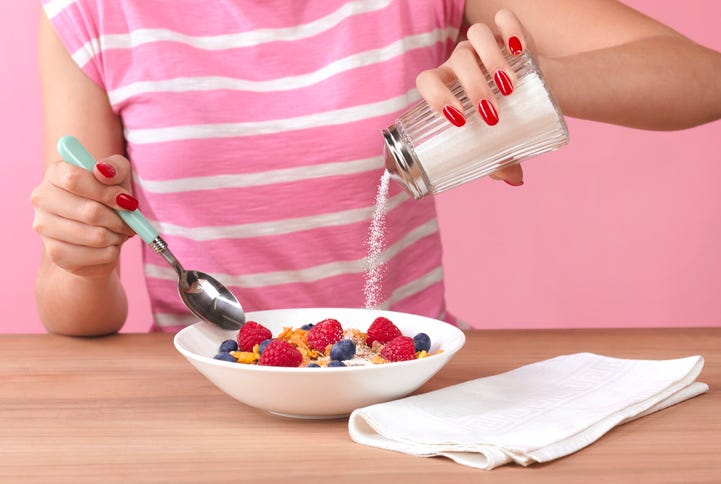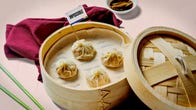
Sugar is the black sheep of the health and wellness world. Whether you love it, avoid it like the plague or fall somewhere in between, sugar is one of the most hotly debated topics in health. A very real, yet perplexing situation, is what I call a sugar "hangover." No matter what you call it, feeling tired or dizzy after eating sugar can happen, but what does it mean exactly?
One minute you can be riding a sugar high, and the next you feel just plain gross. Sometimes it happens right away, or has a delayed effect (like if you eat one too many cookies at night and wake up the next day with a headache). While you may not get a full-fledged "hangover" every time you eat sugar, even feeling a little bit bad is annoying. To find out why this happens I talked to Amy Gorin, a registered dietician and owner of Plant-Based Eats.
Why does sugar make you feel bad?
It's no secret that too much sugar is a bad idea for your health. Where things can get complicated is when you talk about different kinds of sugar, since not all sugar is created equal. Some people may say "sugar is sugar," which is true to an extent, but the sugar that you find in a natural whole food, like an apple, is a bit different than the sugar you find in a doughnut for example.
If sugar is regularly making you feel bad, Gorin says to start with considering what kind of sugar you're eating. "When it comes to sugar, there are two types: naturally occurring sugar and added sugars. Naturally occurring sugars are in foods like fruit, vegetables and dairy -- and these aren't the types of sugars you need to be super watchful of unless you have a condition like diabetes," says Gorin.
Added sugars are the ones that you find in desserts like cookies and cake, but they can even show up in surprising foods like baked beans and canned fruit. "These added sugars can give you a sugar spike of energy and then zap your energy after that spike. If you overconsume them in one sitting, you might not feel so great," explains Gorin. Another reason why sugar makes you feel crummy is because overeating it can cause inflammation in the body, according to Gorin. The way this works is what researchers say is via a process in the liver that creates free fatty acids, which can lead to inflammation, according to Medical News Today.
How you feel when you eat sugar isn't just about what type of sugar or how much you're eating though. Something else to keep in mind is what you're eating alongside the sugar. "[Sugar] definitely can [make you feel sick], especially if you eat something that's straight added sugar and that doesn't have any protein, fiber or fat to help balance out how quickly that sugar will have an effect on you," explains Gorin. Protein, fat and fiber are key nutrients to keeping your blood sugar balanced and can help even out the spiking effect that sugar has on your blood sugar.
"That's why if you were to go for a piece of candy, it's better to choose a Snickers bar, which contains that fiber, fat and protein versus say a Pixy Stix, which is straight sugar," explains Gorin.

Sugar is easy to go overboard on -- here's how to avoid the sugar hangover.
Getty ImagesHow to eat sugar and avoid 'sugar hangovers'
First, you should try to stay in the recommended range for daily intake of sugar, which is about 50 grams of added sugar per day. "You should aim to keep your added sugar intake at 10 percent or less of daily calories. For a 2,000-calorie daily diet that would be no more than 200 calories or 50 grams of added sugar per day," says Gorin.
"Besides keeping your daily total sugar intake at or below the 50 grams per day guidelines, you should also avoid eating lots of sugar in one sitting," she adds. "Spacing out the sugar you eat throughout the day will be easier on your body and blood sugar. Again, combining sugar with other foods that contain protein, fat, and or fiber will also help you feel more balanced."
Another tip from Gorin on reducing sugar intake and avoiding a sugar hangover is to make your own dessert at home. This way you can control exactly what goes in your food and there is no guessing about how much sugar you could be eating. "One of the easiest ways to reduce your intake of added sugars is to make your own desserts that don't contain any added sugars," says Gorin. "For instance, you can make a homemade 'nice cream' or even a chocolate pudding that doesn't contain any added sugars. These recipes are sweetened naturally with fruit," says Gorin.
When you want to avoid extra sugar, another tip is to use spices that taste naturally sweet to your food. "Spices like cinnamon and nutmeg are on the sweeter side and can add sweetness to drinks like coffee and foods like oatmeal," says Gorin.
The information contained in this article is for educational and informational purposes only and is not intended as health or medical advice. Always consult a physician or other qualified health provider regarding any questions you may have about a medical condition or health objectives.
"avoid it" - Google News
September 28, 2021 at 07:00PM
https://ift.tt/2Y7bSs7
Sugar hangovers: Why you feel bad after you eat sugar - CNET
"avoid it" - Google News
https://ift.tt/3844a1y
https://ift.tt/2SzWv5y


No comments:
Post a Comment